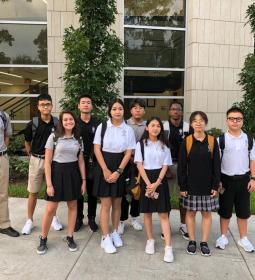Journalism diplomas are part of a broader field of study in communications. Leading universities and colleges in the Netherlands offer a bachelor's / master's degree in journalism, develop skills in providing information, involving the audience, working with different media channels. The study of journalism involves the study of several media, including radio, television, press agencies, or online media.
The Netherlands is a very popular place to study. Foreign students choose this beautiful country because local universities are among the best in Europe, the standard of living is high, the society is loyal to foreigners who can start living in one of the happiest and safest countries in the world. English is spoken by about 90% of Dutch citizens, a variety of employment and internship opportunities – all this makes the country attractive for expats.

Study journalism programs in the Netherlands
The journalism course teaches you to work with various media, to work only with the most important information. The curriculum includes subjects such as media history, media education, communication, sociology, psychology, economics. If you are interested in working in a dynamic industry, a diploma in media will be the right choice.

The courses offered range from journalism to media design, from media technology to management.
Journalism studies programs in the Netherlands:
- International communication and media
- Journalism
- Communication
- Media Design
- Media Management
- Media Technologies
- Media Research.
The media industry offers countless opportunities, is open to those who change professions, there are courses in social, behavioral or social sciences. For creative people, there are definitely interesting subjects among art courses.
Bachelor' / Master's degree in journalism combines theory, practice, offers work in international projects, teaches creative writing. Apart from the internship, many Dutch universities also offer the opportunity to spend a semester abroad to gain additional experience.
If you already have a bachelor's degree in journalism, universities in the Netherlands offer unique master's programs in journalism, media, communication. Students of the master's course usually study in depth the issues of media development, journalism, can specialize in the field of sports or online journalism.
Restrictions in enrolling Journalism courses in the Netherlands

Journalism courses at universities in the Netherlands offer a fixed number of places, as it is popular among local and foreign students. There is even a lottery procedure.
Requirements for admission to journalism programs at universities in the Netherlands:
- Qualification for university admission – VWO (voorbereidend wetenschappelijk onderwijs) or International Baccalaureate
- Knowledge of academic English.
Employment prospects for graduates with a degree in journalism
After completing your education in journalism, you will be able to practice your journalistic skills in daily newspapers, on television, radio, in digital media. PR agencies are constantly looking for creative journalists – graduates have many different options in the international labor market.
Twente University

One of the best universities in the Netherlands, Twente University, offers prestigious programs in technology, science, engineering, social sciences. Communication professionals study the behavior and interaction of people in the context of a high-tech digital society. UT students immerse themselves in theory, solve practical problems, get acquainted with the serious problems of today, explore the important, comprehensive role of communication in solving these problems.
Each academic year consists of 4 modules. The module lasts 10 weeks and includes four components:
- Project
- Theory
- Investigations
- Academic and professional skills.
The core of each module is a project that reflects a modern global challenge. Students will get acquainted with the theoretical foundations of specific problems, conduct their own research, learn how to communicate effectively. Students work under the guidance of a group of passionate counselors/mentors; Assessment methods will range from individual written tests, individual and group assignments to oral tests, individual and group presentations.

In most modules, students work in multicultural project groups, conduct research while working on their projects. The goal is to encourage students to take an active approach to learning, identify strengths, and develop intercultural skills.
Graduates become communication specialists by studying the program on three contemporary topics:
- digital society
- changing organizations
- persuasion technology.
Communication in today's digital international world offers tremendous opportunities: courses on this topic are dedicated to finding ways to ensure that in the future everyone benefits from new communication opportunities.










